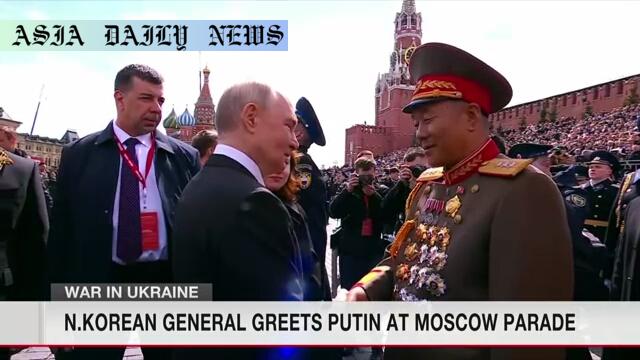Putin greets a North Korean delegation at Moscow’s military parade marking Soviet Union’s victory in World War Two.
Putin greeted a North Korean delegation at Moscow’s military parade.
The parade commemorates the Soviet Union’s WW2 victory.
North Korean soldiers assist Russia in cross-border operations.
Kim Jong Un vows to strengthen the Russia-North Korea alliance.

Overview of Moscow’s Victory Parade
Moscow’s Red Square became a focal point of international attention as leaders from over 20 nations, including Russian President Vladimir Putin and Chinese President Xi Jinping, gathered to commemorate the Soviet Union’s pivotal role in World War Two. One of the significant moments of the event was Putin embracing Kim Yong Bok, deputy chief of North Korea’s general army staff, signaling Russia’s strengthening ties with Pyongyang amidst global tensions. The parade emphasized military strength and diplomatic collaboration, maintaining a fine balance between power projection and regional partnerships.
Russia-North Korea’s Growing Camaraderie
The presence of North Korean representatives at the military parade is a testament to the deepening ties between Moscow and Pyongyang. Although North Korean troops were absent among the 13 nations whose forces actively participated, their delegation was warmly received by Vladimir Putin. The Russian leader’s acknowledgment of North Korean soldiers in the Kursk region, aiding in efforts against Ukrainian forces, further solidifies this evolving alliance. North Korean leader Kim Jong Un’s recent pledge to strengthen their bilateral relations underscores the significance of these developments in the current geopolitical climate.
Geopolitical Implications of Russian-North Korean Relations
With the global sphere witnessing rising conflicts and the reshuffling of old alliances, Russia and North Korea’s camaraderie introduces new dynamics to international relations. As a result of the growing convergence of interests, North Korea’s symbolic and tactical support to Russia, especially in its cross-border conflicts, highlights an emerging axis of cooperation. Simultaneously, these developments may intensify scrutiny and pressure from Western powers, accentuating the divide between major global alliances. This diplomatic move by Putin can be viewed both as a maneuver to expand his circle of allies and a demonstration of Russia’s adaptive approach to evolving geopolitical circumstances.
The Strategic Role of Symbolism in Diplomacy
The handshake and embrace between Putin and Kim Yong Bok are images that resonate with layers of diplomatic symbols. In a world where political gestures often speak louder than words, such overt displays of friendship serve as tools to signify existing and emerging alliances. By acknowledging North Korea’s contributions publicly, Russia sends a clear message of its expanding diplomatic horizons. This parade reflects not only the celebration of history but also a platform to shape narratives and align international futures.
Commentary
Strengthening Bonds in a Shifting World
The embrace between President Putin and North Korea’s representative at Moscow’s military parade highlights a significant pivot in international relations. In recent years, the relationship between Russia and North Korea has evolved from mere formal diplomacy into a strategic alliance. This development is particularly relevant amid the ongoing conflict in Ukraine and increasing tensions between global powers. Perhaps, it’s not merely about military cooperation but a broader geopolitical strategy to counterbalance Western alliances.
Symbolism in Diplomatic Showcase
Symbolism plays a pivotal role in diplomacy, and Russia’s military parade epitomized this to perfection. The parade did not just commemorate past sacrifices; it served as an international stage to project contemporary loyalties and alliances. Putin’s heartfelt acknowledgment of North Korean efforts and leaders, combined with loud promises of strengthened ties, underpins a growing bond that is likely to influence East Asian geopolitics considerably. Such actions demonstrate the intent to align with nations and ideologies that challenge existing power structures.
Potential Consequences for Global Politics
However, such overt diplomatic moves are not without consequences. Western nations may perceive the growing Russia-North Korea ties as a challenge to existing international frameworks. This evolving partnership may lead to stricter sanctions or unified opposition from NATO and its allies. Yet, for Russia and North Korea, this is an opportunity to highlight solidarity amidst isolation, realigning themselves as powers to reckon with. The significance of such collaborations may unfold further, setting the stage for more complex international dynamics in the decades to come.


